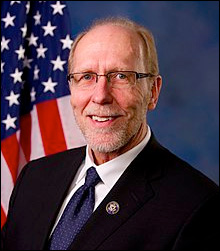By Jim Ellis

Iowa Rep. David Loebsack (D-Iowa City) to retire
Since his first re-election, Loebsack has generally faced Republican competition, but the GOP has never been able to elevate a challenge against him to top-tier status. Still, in his seven elections, Rep. Loebsack recorded only a 53.7 percent average victory margin. Last November, he defeated Republican Chris Peters, who also ran in 2016, 54-42 percent.
Iowa’s 2nd District occupies the southeastern quadrant of the four congressional districts in the state under a mapping plan that divided the territory geographically by quarters. The two largest 2nd District population centers are the cities of Davenport (102,000 population) and Iowa City (74,000).
Politically, the 2nd looks to be the strongest Democratic district of the state’s four seats, but the electorate did support President Trump with a 49-45 percent margin. Previously, however, President Obama ran strong here in both of his national campaigns, carrying the district 56-43 percent in 2012 and 57-42 percent during his initial 2008 campaign.
With President Trump needing to win Iowa next year, it is clear that his campaign will attempt to maximize right-of-center turnout in IA-2, meaning a potential Republican open seat congressional candidate should get an indirect boost. Now, with no Democratic incumbent running to defend the seat, this district figures to become a key GOP conversion opportunity.
Since the Loebsack announcement comes as a surprise, there will be a time lapse for potential candidates from both parties to come forward. We can expect a pair of active primaries, which will lead to a competitive November campaign.
Under Iowa election law, a candidate can win nomination in a plurality vote. Should the first-place finisher’s winning percentage number drop under 35, however, a special district convention would be convened post-primary to select a nominee.
The last time a congressional nomination battle required a convention occurred in 2014 when Republican David Young, who actually finished fourth in the voting primary, won nomination through the party delegate vote. Young would go onto win the general election in both 2014 and 2016 but fell to current Rep. Cindy Axne (D-West Des Moines) this past November.
The Loebsack retirement marks the ninth open seat for the 2020 election cycle, with three already in 2019 special elections. Rep. Loebsack becomes the third Democrat to announce that he won’t seek another term next year. Rep. Jose Serrano (D-NY) is retiring after what will be 30 years in Congress, while Rep. Ben Ray Lujan (D-NM) has announced his intention to enter the open New Mexico Senate race.
Republicans are risking the three seats in special elections in PA-12, NC-3, and NC-9. The latter race, which has been held in suspension since the 2018 general election because of vote fraud allegations, is the best conversion opportunity (in this case from Republican to Democrat) of any of the nine open seats to date.
The other 2020 GOP incumbent-less seats are: AL-1 (Rep. Bradley Byrne), GA-7 (Rep. Rob Woodall), and UT-1 (Rep. Rob Bishop). Of the nine total open seats, it appears the GA-7 district, which was decided by a slight 419-vote margin in November, and IA-2 likely will be the most competitive.
